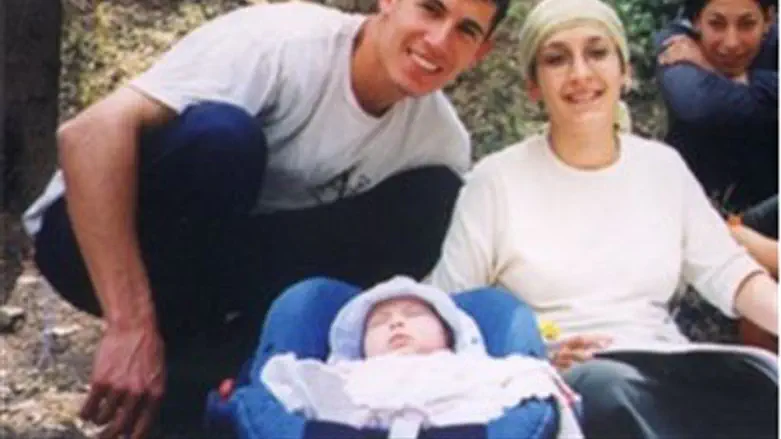
The coming month will mark the ninth anniversary of a deadly 2002 terror attack in the Samaria community of Elon Moreh.
The attack occurred when a Hamas terrorist entered the home of the Gavish family, gunning down the parents, Rachel and David, and their son, 25-year-old Avraham, who was home on leave from an elite army unit at the time of the attack. Rachel’s father, Yitzhak Kanner, 74, was also shot and killed in the attack, which occurred during the Passover holiday.
Avraham’s wife, Na’ama Gavish, survived the attack by hiding under a table with her daughter. She held her daughter’s mouth shut and waited for the terrorist to go up to the second floor. She then fled the house, saving her life and that of her daughter.
The recent massacre of five members of the Fogel family in Itamar by terrorists as they slept in their beds on a Friday night has made many memories raw again for Na’ama. In an interview in this past weekend's issue of the Ma'ariv newspaper, she spoke of her feelings following the massacre in Itamar and how she is dealing with her own personal tragedy.
“I know what Tamar Fogel is feeling,” Na’ama said. “I know how it feels when parents are murdered. It’s an indescribable shock. You can’t think and you can’t function, as if you’re in a coma. It’s like being mentally wounded, you’re half dead and half alive. Dealing with it is very difficult. Tamar is now surrounded by love but hard times are waiting for her. The way to deal with the disaster is to believe and know that everything that the Almighty does has a purpose. He is what determines who lives and who dies, and we do not know the reason.
“Tamar Fogel should know that there is a perspective of time and as time passes, a person undergoes certain mental processes,” added Na’ama. “What you feel now is not what you’ll feel in a year. Time does not make the pain disappear and does not reduce it, but it turns it into something different. It turns it into a pain that will allowe her to live even if it does not look that way right now.”
During the interview, Na’ama Gavish also recalled the events of the terrible night when her husband was murdered.
“Avraham and his grandfather were opposite the entrance to the house and the bullets hit them. I did not see Avraham but I noticed that his grandfather’s body lay on the floor beside me. I grabbed my daughter Daria and hid under the table. I hugged her tightly and put my hand over her mouth so she wouldn’t cry. I acted rationally but my mind was blank. I thought of nothing.
“I concentrated only on my daughter’s and my survival,” she continued. “Every time I heard shots I was sure that Avraham was fighting the terrorist and that all the children on the second floor were dead. Suddenly I heard footsteps right beside me. I saw the terrorist’s shoes. His walk was peculiar. He swayed like someone who is drugged or drunk. He didn’t notice me and went on to the other rooms. I heard him shoot. It seemed like forever but once he moved away from the table I quickly got up and ran through the door of the balcony. While I was running I said to myself: ‘Na’ama, Do not look back, just run.’ Once outside I saw the emergency squad and shouted to them that there is a terrorist inside.”
Na’ama’s husdband Avraham was a successful officer in Sayeret Matkal. He had been shot in the foot by the terrorist, crawled quickly toward the stairs and asked his brother, Avigdor, who was upstairs, to throw him his weapon. He managed to grab hold of the rifle but the terrorist spotted him and shot him in the head.
“Someone decided that Avraham would die and that Daria and I would live,” said Na’ama. “Human beings have a desire to control the situation but we do not control fate. It is the Creator who does.”
Avraham is survived by his wife, daughter, four brothers and two sisters. He was buried at the cemetery in Elon Moreh along with his parents and grandfather.
In 2006, in what was more of a symbolic ruling than anything else, an Israeli court ordered Hamas to pay 10 million shekels to each of the family’s survivors, plus sums to cover lawyer fees and court expenses. The plaintiffs in the case were Rachel and David Gavish’s six remaining children, Na’ama and Daria, and Yitzhak Kanner’s son, Moshe.
The court held that while the amount claimed by the plaintiffs was suitable, it could never “dull the pain of the survivors who must continue living with a trauma that will accompany them to the end of their lives.”
